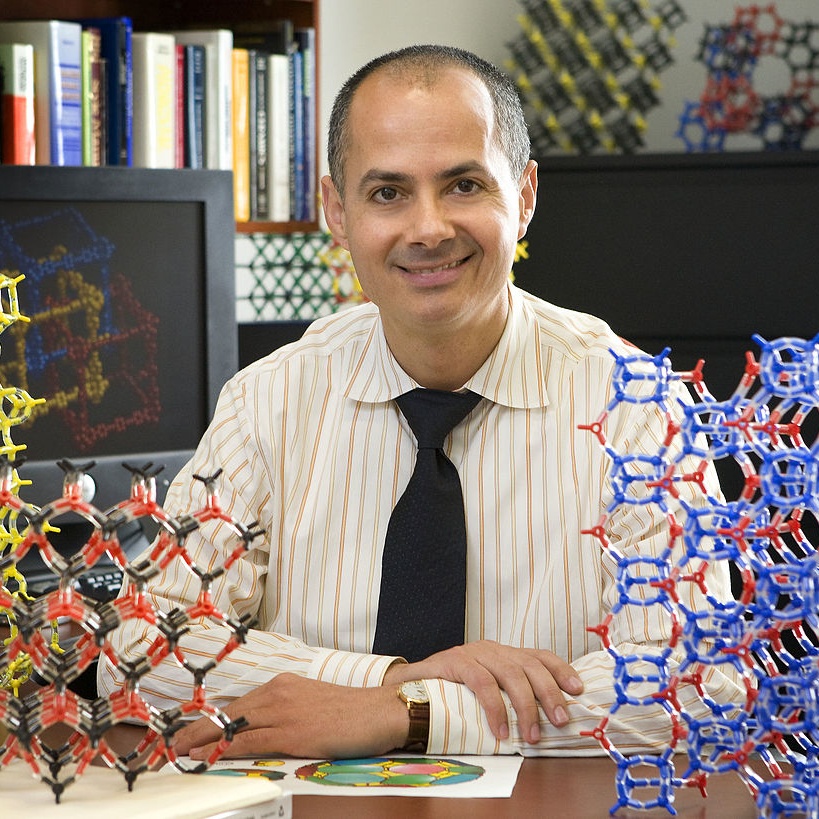Speakers
‹ Back
Prof. Omar Yaghi
James and Neeltje Tretter Chair Professor of Chemistry, UC Berkeley, California
CV
Omar M. Yaghi received his B.S. from State University of New York at Albany (1985) and Ph.D. in Inorganic Chemistry from University of Illinois at Urbana-Champaign (1990). He was an NSF Postdoctoral Fellow at Harvard University (1990-92). He started his independent career as an assistant professor in 1992 at Arizona State University, moved to University of Michigan at Ann Arbor as Robert W. Parry Professor of Chemistry in 1999, and then UCLA in 2006 as Christopher S. Foote Professor of Chemistry and Irving and Jean Stone Chair Professor in Physical Sciences. Since 2012 he has been the James and Neeltje Tretter Chair Professor of Chemistry at University of California, Berkeley, and a Senior Faculty Scientist at Lawrence Berkeley National Laboratory. He is the Founding Director of the Berkeley Global Science Institute, and the Co-Director of the Kavli Energy NanoSciences Institute, and the California Research Alliance by BASF.
His work encompasses the synthesis, structure and properties of inorganic and organic compounds and the design and construction of new crystalline materials. He is widely known for the discovery and for pioneering the development of several extensive classes of new materials: Metal-Organic Frameworks (MOFs), Covalent Organic Frameworks (COFs), and Zeolitic Imidazolate Frameworks (ZIFs). These materials have the highest surface areas known to date, making them useful in many applications including the (1) storage and separation of hydrogen, methane, and carbon dioxide, (2) conversion of carbon dioxide to fuels and high value chemicals, (3) capture of water from air for fresh water production (4) highly selective cleavage of peptides using enzyme-inspired catalysis, and (5) storage of ions in supercapacitor devices, and transport of protons and electrons in conductive frameworks. The building block approach he developed has led to an exponential growth in the creation of new materials having a diversity and multiplicity previously unknown in chemistry. He termed this field 'Reticular Chemistry' and defines it as 'stitching molecular building blocks into extended structures by strong bonds'. This chemistry is now being practiced using methods developed by Yaghi since 1995 in hundreds of laboratories in academia and industry worldwide.
His early accomplishments in the design and synthesis of new materials were honored by the Solid-State Chemistry Award of the American Chemical Society and Exxon Co. (1998) and the Sacconi Medal of the Italian Chemical Society (2004). His work on hydrogen storage was recognized by Popular Science magazine, which listed him among the 'Brilliant 10' scientists and engineers in the United States (2006), and the US Department of Energy Hydrogen Program Award for outstanding contributions to hydrogen storage (2007). He was the sole recipient of the Materials Research Society Medal for pioneering work in the theory, design, synthesis and applications of metal-organic frameworks and the AAAS Newcomb Cleveland Prize for the best paper published in Science (2007). He is also the recipient of the American Chemical Society Chemistry of Materials Award for pioneering methods for the design and synthesis of metal-organic frameworks of exceptional porosity and industrial applications (2009), Izatt-Christensen International Award (2009), United Kingdom's Royal Society of Chemistry Centenary Prize (2010), China Nano Award (2013), King Faisal International Prize in Science for seminal contributions to metal-organic frameworks (2015), Mustafa Prize in Nanoscience and Nanotechnology for extensive research in the field of MOFs and clean energy (2015), Turkish Academy of Sciences Prize in Basic and Engineering Sciences for establishing Reticular Chemistry (2016), Royal Society of Chemistry Spiers Memorial Award for pioneering the conceptual and experimental basis of crystalline metal-organic frameworks and covalent organic frameworks (2017), the King Abdullah II Order of Distinction of the First Class - the highest civilian honor bestowed by the King of Jordan (2017), and the Albert Einstein World Award of Science conferred by the World Cultural Council for his ground-breaking scientific contributions in the development of metal-organic frameworks (MOFs) and covalent organic frameworks (COFs), and for establishing a new field of chemistry – Reticular Chemistry (2017). He published over 250 articles, which have received an average of over 300 citations per paper. He is listed among the top five most highly cited chemists worldwide.